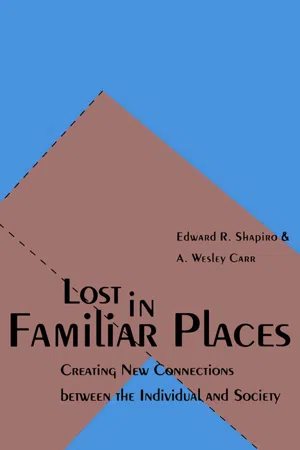Lost in Familiar Places
About this book
We live in a world of accelerating change, marked by the decline of traditional forms of family, community, and professional life. Both within families and in work-places individuals feel increasingly lost, unsure of the roles required of them. In this book a psychoanalyst and an Anglican priest, using a combination of psychoanalysis and social systems theory, offer tools that allow people to create meaningful connections with one another and with the institutions within which they work and live.
The authors begin by discussing how life in a family prefigures and prepares the individual to participate in groups, offering detailed case studies of families in therapy as illustrations. They then turn to organizations, describing how their consultations with an academic conference, a mental hospital, a law firm, and a church parish helped members of these institutions to relate to one another by becoming aware of wider contexts for their experiences. All the people within a group have their own subjectively felt perceptions of the environment. According to Shapiro and Carr, when individuals can negotiate a shared interpretation of the experience and of the purposes for which the group exists, they can further their own development and that of their organizations. The authors suggest how this can be accomplished. They conclude with some broad speculations about the continuing importance of institutions for connecting the individual and society.
Frequently asked questions
- Essential is ideal for learners and professionals who enjoy exploring a wide range of subjects. Access the Essential Library with 800,000+ trusted titles and best-sellers across business, personal growth, and the humanities. Includes unlimited reading time and Standard Read Aloud voice.
- Complete: Perfect for advanced learners and researchers needing full, unrestricted access. Unlock 1.4M+ books across hundreds of subjects, including academic and specialized titles. The Complete Plan also includes advanced features like Premium Read Aloud and Research Assistant.
Please note we cannot support devices running on iOS 13 and Android 7 or earlier. Learn more about using the app.
Information
Table of contents
- Contents
- Preface
- Acknowledgments
- Introduction
- Part I. Learning from the Family
- Part II. Moving to Organizations
- Part III. Applying the Interpretive Stance
- Part IV. Developing Wider Interpretations
- Final Reflections
- Notes
- Bibliography
- Permissions
- Index
